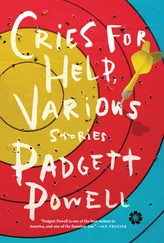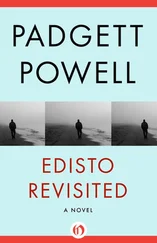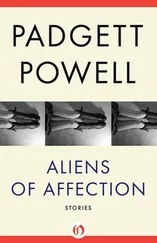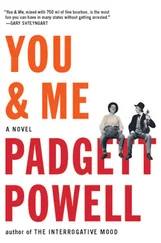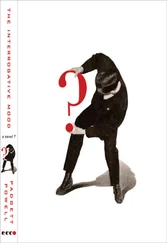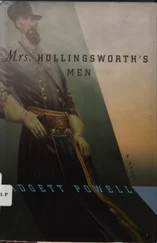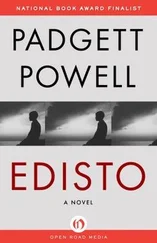THE MAN WHO HAS seen Forrest takes a room over the café. How long he will want the room he does not know. It is white. The floor is oak, with a gymnasium certainty to it, clean and hard. He wants nothing on it. He has one chair, by the window. There is a radio. It is black and on, but silent. A red stereo-indicator light shows, and a comforting green luminescent tuning band. The man is unsure whether he has found this appliance (improbable) or brought it (improbable). The tuning band shows the same comforting green light that originally issued from radium in such an application. He considers, not seriously, throwing the radio out the window.
Out the window, on the courthouse lawn, wearing blazing white shirts and loose herringbone trousers held up by handsome suspenders, are three or four or five or six or seven black men who appear to be ancient. Realistically — a word or notion that rolls saltily and oddly in the man’s head, like an olive — they are probably seventy years old, but the impression they give is that they were alive when the great minié-ball debate over their fate took place. Like the radio, they too are on and silent and improbably placed. What they are discussing the man has no idea, in their immaculate clothes, consummately sober and peaceful and wise-looking, immutable agreeable whiskate.
The man turns and looks at his four plain walls and regards them as an invitation to rest.
Down on the courthouse lawn, he makes four plain mistakes.
— Gentlemen (#1), what town is this? I mean (#2), I’ve been driving and enjoying the scenery (#3), and my map is torn right where I think this is, I can’t read where I am, I think.
— Where your map?
— In my car.
— Where your car?
The man waves vaguely behind himself (#4). He looks up at the window of his new room. He sees himself smiling and smirking at his intelligence-gathering mission among the seated sages.
— Holly Spring.
— Holly Spring what?
— Holly Spring what what?
— Which Holly Spring?
— This Holly Spring.
— Which state Holly Spring?
— State?
— He say his map bad.
— His map real bad.
— Missippi.
— Mississippi?
— Missippi.
The man waves to himself in his window, not concealing his waving to no one from the dark sages, which is not mistake #5. It says to them, Lost? Maybe loster than you think, gentlemen.
He claims his room for his rest.
The bed is as loose in its springs as a hammock. The sheet is a coarse, clean muslin that is very agreeable, as is his near engulfment into the slung posture of the mattress. He hears a noise, probably under the floor, probably a rat.
What he would like it to be is a woman. He thinks: tunneling her way to me. Let her emerge from this clean, hard floor, splintering it with her desire for me, and let me bathe her and place her on a pallet on the floor and behold her. Let us eat. Let us have each other in a fresh way in a fresh start and keep it fresh, keep it starting. To have a woman in perpetual start!
EMERGING FROM THE FLOOR, she is gauzy, dark, as if seen through frosted glass, full red lips prominent. At this moment, before the ruination can begin, the man is happy. He has been a Gila monster and is now a puppy. The woman has strong hands and does not fidget with them. This, the man says, let us keep it to this. His lips are numb.
— Wait until you get a load of Forrest.
The woman posts herself on the chair by the window, and the man watches her watch for Forrest. Her red lips are blued with the pressure of her determination.
— Were you Lonnie?
— Were you Sally?
— Shh.
Mother of Father, Flat of Knife
FIST, SKULL, STOMP, GOUGE, ride! Forrest says, when you are the fastest with the mostest until you are the leastest with the lastest. (Mrs. Hollingsworth thought Forrest actually said some of this.) He is through the gentlemen of ebony tribal regalness and elegant white shirts in an unseen unfelt blast of oilcloth and horse lather and unsmelt tang of silver spur, the flat of his saber in abeyance.
The man who can see him recalls that the mother of his father would slap his father with the flat of her carving knife. She was a great proud carver, which women seldom are, of ham and tongue, and she did not like pickers picking at her work. Her knife was red-handled and pitted, a blackened steel that showed a shiny edge. She slapped the hands of children regularly with it. She could tell a child a lie.
Forrest is a ghostly trail of dust and sweat and malice, a struck chord of straining tack and sheathed weapon and purpose. His lips are set in a line not unlike the new woman’s, but they do not show the blue of the pressure of determination, as hers do. Forrest’s lips are easy, deliberate without deliberation, exactly like a horse’s lips. He is an animal, all right, the man says. Did you see him?
— I saw him. I thought him wizened. I read that he declined.
— Declined what?
— No, declined. Fell off some. Withered. At the end.
— If he declined, Lord let him not incline.
— No.
First Breast Not of One’s Mother
WHEN HIS GRANDMOTHER, WHO could tell a child a lie, with pleasure, pursing her lips after it in a satisfied way, as if savoring a chocolate, died, Lonnie Sipple cried. The look on his grandmother’s face when she told him a lie was the same as the look on her face when she played poker.
When he met Sally Palmer and with his lips lifted her breast by a gentle pursing of the flesh just below her nipple, and felt the orangelike weight of her breast, it was the last clear moment of sanity and purpose on earth he would know. It was possibly the first such moment, but he cannot remember anything before the moment, and cannot precisely recall the moment itself, and all since has been a sloppiness in his head and his heart.
He did not die of a pitchfork tine to the heart. That was romantic palaver of the burning-mule stripe, and far too easy. He did in fact once find a tine, isolated and alone, in a field, but it did not touch his heart. It had about it a roughened, pitted quality not unlike his grandmother’s carving knife. All steel, he thinks, was more or less alike in those days.
“MOST TIMES FORREST RIDES,” Mrs. Hollingsworth began her list one day, thinking of the way the teenagers in the neighborhood talk and slink around, or slump around, being wiggers. Most time Mist Forrest ride but sometime he slide.
Sometime he take off his butternut duster look like Peterman catalogue, and his Victoria Secret garter belt and all, and grease hisself up naked as a jaybird and say, Okay, I fight all you, black white blue gray I don’t care. Y’all come on. And people being dumb as shit, they come on, and they get they ass whup.
He so good he go to a wrassling tournament in Turkey once, during a time when he spose be recovering from a ball to the hip, which is how you say he got shot in them days. Never heard that about no Vietnam: my buddy he took dis ball to the hip, but he rode on! Shit. Em all saying, Found my buddy wid his balls in his mouf! Everybody drunk and all, going to the VA get pills. But back in Forrest time, it was ball to the hip, like soccer, and you went on, and went back later and kilt mo Yankee. One time I say to this honky on his bicycle, Clean up America, kill a redneck today! and it kind of surprise him. I guess since I look white and all. I’own know why he surprise, actually. Near everything surprise the white boy, that why he so white. He sur prise all the time.
Читать дальше

